Lesson 18
八年级英语上册-Lesson-18-Get-Ready-for-Turkey-!课件-冀教版
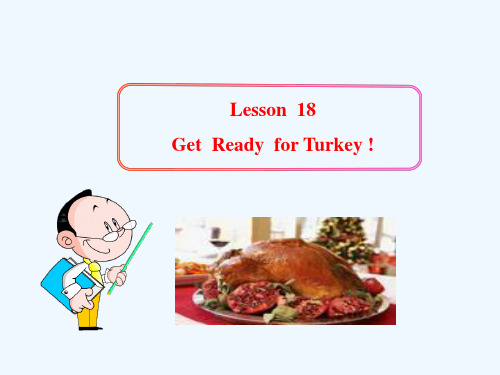
Ⅱ. 用所给词的适当形式填空 1.Grandma__b_o_u_g_h_t_(buy) a turkey yesterday. 2.I want __t_o_s_e_e__(see) my aunt. 3.They __a_r_e_t_a_lk_i_n_g__(talk) about the holiday now. 4.This lesson made me very __h_a_p__p_y_(happy). 5.The bad news made the boy __c_r_y_(cry). 6.The workers are made _t_o_w__o_r_k_(work) all day and all night.
You can do it like this : I have a happy family. There are five members in my family. They are… My father is a … My mother is a…
Homework
1.Talk about Thanksgiving! 2.Do the exercises in your workbook.
Think about it!
1. Have you ever eaten turkey or pie? 2. Who comes to celebrate festivals with your family? 3. How does Brian feel this Thanksgiving? Why? Make a guess.
Write a passage !
1:Whom (谁)will you give thanks to ? 2:What do you want to say to them ?
新概念英语lesson 18课

Grammar: have 的用法
1.用作助动词,用于完成时have+动词的过去分词
I have finished my work.
2. 使让类动词。“使……” have sb do 让某人做
The teacher have his students play on the playground.
4. 常见的give 短语
3) give up 放弃; 认输 他已经放弃了这个念头。
He has given up the idea.
她放弃了工作以照顾她生病的母亲。
She gave up her job to look after her sick mother.
5. beside 和 besides
writer’s bag?
Text comprehension:
2)Listen for duenbtelaievialbele d information
①Did
the
writer have lunch 2. ADJ 极其糟糕的;令 人震惊的;令人无法相
at
a
village
pub or not?
1) give in 屈服; 投降; 让步 交;strators were compelled to give in to the police.
12点以前必须交论文。
All papers should be given in before 12 o'clock.
3实意动词 “有...”
I have a pen. I have a headache. I had a bath before dinner.
4. have to = have got to 不得不
冀教版英语七年级上册_Lesson18_教材知识详解

Lesson18 教材知识详解1. What does he/she look like? 他/她长什么样?(1)本句是用来询问某人的外貌的,其句型为“ What do/does +主语+look like?”回答时可用“主语+系动词+形容词”或“主语+ have/ has+(a/an+)形容词+名词”表示。
如:—What does your father look like? 你的爸爸长什么样?一He is tall and thin.他又高又瘦。
(2)look like意为“看起来像”,后面可接名词、代词等作宾语。
其中look为系动词,表示“看起来”,后面常接形容词构成系表结构。
like为介词,意为“像、如、跟……一样”。
如:She looks like her aunt.她看起来像她的姑妈。
2. Jenny is from Canada. 詹妮来自加拿大。
be from…意思是“来自……”,之后接表示国家的词,表示某人或某物来自某个国家。
如:I am from China.我来自中国。
come from也表示“来自”,可以与be from互换。
如:I come from China.=I am from China.我来自中国。
3. She has short blond hair. 她有金色短发。
当一个句子中同时有长短、颜色两个形容词来修饰名词时,我们通常把长短放在颜色的之前。
如:I have long, black hair.我有黑色的长发。
当一个名词有两个或两个以上的形容词修饰时,它们的顺序通常是:限定词+描绘性形容词+特征性形容词(大小、颜色等)+名词。
如:She has a beautiful white dress.她有一条漂亮的白色连衣裙。
hair意为“头发”,为不可数名词,作主语时,谓语动词用第三人称单数形式。
在指具体的几根头发时,hair可视为可数名词,复数在其后加-s。
四年级上册英语课件 Lesson 18 (共26张PPT) 冀教版

Lesson 18 Lost in the City
课前热身 Let’s chant
Turn left, turn left, left, left, left. Turn right, turn right, right, right, right. Go straight, go straight, straight, straight, straight.
重难点探究
重点词汇 ⑤miss (动词)想念;怀念
例句 拓展
We all miss him. 我们都很想念他。
miss的首字母大写时,意思是“小姐”,后跟 姓氏。如: Miss White 怀特小姐
⑥very (副词)很;非常;十分 例句 She is very beautiful.她很漂亮。 短语 very well 很好
Read and answer
What are there in the city?
Read and answer
Who is lost? Where does she want to go?
Read and answer
What does she see?
Read and answer
Who does the cat meet?
• You have to believe in yourself. That's the secret of success. 人必须相信自己,这是成功的秘诀。
•
Read and answer
What is the cat’s sister’s name? Where does she live ?
we will be late.
新概念英语第二册课件Lesson18共15页PPT

子男)
3.bill /bil/ n. 帐单
• 1.议案;法案 • 2.纸币;钞票 • 3.广告;海报 常用搭配: foot the bill 付账;负责 pay/settle the bill 付账 fill the bill 适合
text
• 1、After I had had lunch at a village pub, I looked for my bag.
• Pub是public house(酒店,酒店) 的缩写
• Let’s go to the pub for a drink.
• 2、I had left it on a chair beside the door and now it wasn't there!
• leave除了“离去,离开,出发” 的意思,还可以表示“把(人、 物)留下,遗留,丢下”等。
还有许多其他事要做。 • beside pron. 在……旁边,在……附近 • besides adv. 而且,并且,此外;pron. 除……
之外(还)
• I’m quite busy today. Besides, I’ve got a bad cold.
• There were a lot of people at the party besides us.
Have的用法
• 1、have作为助动词构成各种完成时和完成 进行时
• 2、have还可以作完全动词,当作“具有、 拥有”讲时,它和have got通常可以互换。 have做 “有, 患病” 概念时, 可作为实义动 词, 也可作为非实义动词。在英国英语中的 疑问句和否定句中have(具有)的用法与 be相同,即可以不用助动词do或did;在美 国英语中,常用do助动词和have一起构成 疑问句和否定句。
四年级上册英语第18课

四年级上册英语第18课Lesson 18 Lost in the City第十八课在城市里迷路Story time 故事时间I have a sister.我有一个姐姐。
Her name is Kitty.她的名字叫凯蒂。
She lives in the city.她住在城市里。
I miss her very much.我非常想念她。
Today, I am going to visit her.今天,我要去看望她。
There are many new streets in the city.在城市里有许多新的街道。
Where is my sister's home?我姐姐的家在哪里?Excuse me.打扰一下。
Yes?什么事?I'm lost.我迷路了。
Where is the NICE house?名叫NICE的房子在哪里?I meet a nice dog.我遇见了一只友善的狗。
The dog says, "Look! Go straight and turn left." 这只狗说,“看!直着走,向左转。
”But when I get there,但是当我到那里的时候,I see the Mice house,我看见的是名叫MICE的房子,not the NICE house.而不是叫NICE的房子。
Oh no!哦不!Excuse me, where is the NICE house?打扰一下,请问叫NICE的房子在哪里?I'll show you.我指给你。
Thank you.谢谢。
I meet an old bird.我遇见了一只年迈的鸟。
The old bird says,这只年迈的鸟说,"Go straight and turn right at the traffic lights. “直着走,在信号灯那里向右转。
Then you will see the Nice house on the left." 然后你就会在左边看见叫NICE的房子。
新概念英语第二册Lesson18

Lesson 18 He often does this! 他经常干这种事! First listen and then answer the question. What had happened to the writer's bag? After I had had lunch at a village pub, I looked for my bag. I had left it on a chair beside the door and now it wasn't there! As I was looking for it, the landlord came in. 'Did you have a good meal?" he asked. 'Yes, thank you,' I answered, 'but I can't pay the bill. I haven't got my bag.' The landlord smiled and immediately went out. In a few minutes he returned with my bag and gave it back to me. 'I'm very sorry,' he said. 'My dog had taken it into the garden. He often does this!'
新概念第二册 lesson 18课件(PPT26张)

As I was sleeping , a thief came in.
Language points
3.In a few minutes he returned with my bag and give it back to me. in +一段时间 ......以后(常与将来时连用)
→ I will leave for Beijing in three months. return (come back) 回来; 归还
3、have还可以表示 eat, drink,enjoy,take等意思, →have dinner/ a meal/ a cup of coffee/a good time/ a bath
Grammar
have和have got to 互换
下面三种情况,have可以被have got取代 1.I have a pen.=I have got a pen. “有” Has he a lot of money?=Has he got a lot of money? =Does he have a lot of money? 2.I have a headache. “得病”= I have got a headache. 3.have to = have got to “不得不” He had to leave early.=He had got to leave early.
1
3 2
Let's take a 10-minute break!
新概念英语第二册lesson18精品PPT课件
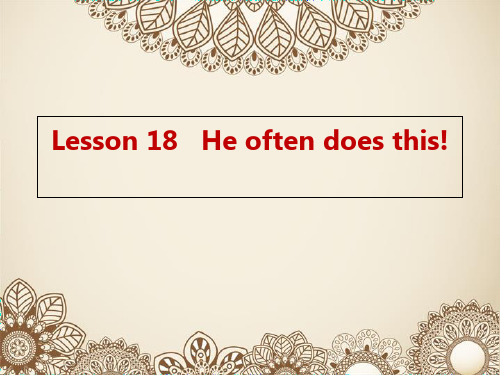
住客栈
2 landlord
(1)主人, 房东(旅馆,家庭,公寓)
(2)地主
lord n . 统治者,主人,贵族,勋爵
Lord! 天啊!哎呀!哎哟! as drunk as a lord 酩酊大醉
landlady 女主人;
3 Bill 1) n. 账单,纸币 (note)
2) n. 招贴,广告,海报
1) n. 账单,纸币 (note) pay the bill/settle the bill
付账
It’s wrong to leave a hotel without paying all your bills. 没有付账离开旅馆是不对的。
新概念英语第2册课程讲义Lesson18

Lesson18单词讲解ndlord n.店主,房东,业主,老板landowner n.2.bill n.账单,单据,清单/钞票/法案/广告pay the billUS dollar billsa crime billa bill boardLesson18课文&语法讲解本课重点:have的用法实义动词助动词have的用法实义动词1.“有”2.“吃喝玩乐做”助动词have的用法实义动词1.“有”I have a book.She has a car.He had a surprise.2.“吃喝玩乐做”have a meal have breakfast have some water have fun have a good timehave a swimhave的用法实义动词助动词(完成时态中)I have received a letter.She has bought a gift.He had left.have的用法(用法不同,变否定疑问也不同)实义动词助动词(完成时态中)I have received a letter.I have not received a letter.She has bought a gift.She has not bought a gift.He had left.He had not left.have的用法(用法不同,变否定疑问也不同)实义动词I have a book.I do not have a book. She has lunch.She does not have lunch. He had a good time.He did not have a good time.助动词(完成时态中)have的用法(用法不同,变否定疑问也不同)实义动词I have a book.I do not have a book. She has lunch.She does not have lunch. He had a good time.He did not have a good time.助动词(完成时态中)I have received a letter.I have not received a letter.She has bought a gift.She has not bought a gift.He had left.He had not left.have的用法练习:(判断用法,并变否定疑问)1.You have a lot of money.2.They had a swim yesterday.3.She has eaten breakfast.4.My dog had taken it into the garden.have的用法练习:(判断用法,并变否定疑问)1.You have a lot of money.2.They had a swim yesterday.3.She has eaten breakfast.4.My dog had taken it into the garden.have的用法练习:(判断用法,并变否定疑问)1.You have a lot of money.You do not have a lot of money.2.They had a swim yesterday.They did not have a swim yesterday.3.She has eaten breakfast.She has not eaten breakfast.4.My dog had taken it into the garden.My dog had not taken it into the garden.have的用法补充两点:“有”have=have got实义动词助动词You have a lot of money.=You have got a lot of money.do not have have not got have的用法补充两点:1.“有”have=have got2.have/has had had hadI had had lunch at a village.We have had trouble with the plan.It has had no effect.1.After I had had lunch…,I looked for my bag.have的过去完成时一般过去时先后2.I had left it on a chair beside the door and now it wasn’t there!beside the doorBesides this book,I have some others.3.As I was looking for it,the landlord came in.4.“Did you have a good meal?”he asked.5.“but I can’t pay the bill.I haven’t got my bag.”6.My dog had taken it into the garden.本课重点:have的用法实义动词助动词Lesson18知识拓展本课重点:if真实条件句(假设将来)Lesson18知识拓展本课重点:have的用法实义动词助动词have的用法实义动词“有”“吃喝玩乐做”助动词(完成时态中)have的用法He had a smoke after dinner.My friend Bill has had a headache.have的用法Their guest room has two big windows.We had had a long vacation after that.本课重点:have的用法实义动词助动词。
《Lesson 18 》 说课稿

《Lesson 18 》说课稿尊敬的各位评委老师:大家好!今天我说课的内容是_____教材中的 Lesson 18 。
下面我将从教材分析、学情分析、教学目标、教学重难点、教学方法、教学过程以及教学反思这几个方面来展开我的说课。
一、教材分析(一)教材的地位和作用Lesson 18 是本单元的重要组成部分,它既承接了前面几课的知识,又为后续课程的学习打下了基础。
通过这一课的学习,学生能够进一步巩固和拓展已有的语言知识和技能,提高语言综合运用能力。
(二)教学内容本节课主要包括词汇、语法、阅读和写作等部分。
词汇方面,重点学习了一些与日常生活相关的新单词和短语;语法部分,涉及到了某个特定的语法结构的运用;阅读部分,提供了一篇具有代表性的文章,以培养学生的阅读理解能力;写作部分,要求学生根据给定的话题进行写作练习,锻炼他们的书面表达能力。
(三)教学目标1、知识目标学生能够掌握本节课的重点词汇和短语,如_____、_____等。
学生能够理解并正确运用本节课的语法结构,如_____。
2、技能目标通过阅读训练,提高学生的阅读理解能力,能够准确获取文章中的关键信息。
通过写作练习,培养学生的书面表达能力,能够用所学语言知识清晰、准确地表达自己的观点和想法。
3、情感目标激发学生学习英语的兴趣,增强学习自信心。
培养学生的合作意识和团队精神。
(四)教学重难点1、教学重点重点词汇和短语的记忆与运用。
语法结构的理解和正确使用。
2、教学难点如何引导学生在实际情境中灵活运用所学的语言知识。
帮助学生克服写作过程中可能遇到的困难,如语法错误、词汇缺乏等。
二、学情分析(一)学生的知识基础经过之前的学习,学生已经掌握了一定的英语基础知识,如基本的词汇、语法和简单的听说读写技能。
但对于本节课的新内容,可能还需要进一步的学习和巩固。
(二)学生的学习能力学生的学习能力存在个体差异,部分学生学习积极性高,善于思考和总结;而部分学生可能需要更多的引导和督促。
新概念英语第一册 Lesson 18-看图识文
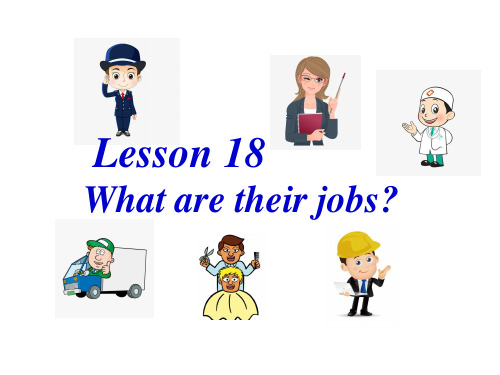
用I, he, she , we, they 填空 1. My name is Hans. I am a sales rep. 2. Our name is Jim and Helen. We are students. 3. That is Michael Baker. He is very tall. 4. Look at Nicola . She is a keyboard operator. 5. Nicola and Claire are employees. They are very
What’s her job ? She is a sales rep.
What are their jobs? They are sales reps.
keyboard operator keyboard operators
What’s her job ? She is a keyboard operator.
Lesson 18
What are their jobs?
1. do, do , how , you ? 2. jobs, are , their, what ?
连词成句
3. young, man, is , who , this ?
4. and, meet , come, employees, our .
What are their jobs? They are keyboard operators.
engineer engineers
What are their jobs? They are engineers.
air hostess air hostesses
What are their jobs? They are hostesses.
新概念英语第二册Lesson18Heoftendoesthis!讲义

新概念英语第二册Lesson 18He often does this!他经常干这种事!After I had had lunch at a village pub, I looked for my bag. I had left it on a chair beside the door and now it wasnt there! As I was looking for it, the landlord came in. "Did you have a good meal?" he asked. "Yes, thank you, "I answered," but I cant pay the bill. I haven‘t got my bag." The landlord smiled and immediately went out. In a few minutes he returned with my bag and gave it back to me."I’m very sorry," he said. “ My dog had taken it into the garden. He often does this!”【课文翻译】After I had had lunch at a village pub, I looked for my bag.我在一家乡村小酒店吃过午饭后,就找我的提包。
I had left it on a chair beside the door and now it wasnt there!我曾把它放在门边的椅子上,可这会儿不见了!As I was looking for it, the landlord came in.当我正在寻找时,酒店老板走了进来。
Did you have a good meal?" he asked.“您吃得好吗?”他问。
Lesson 18 Turn right
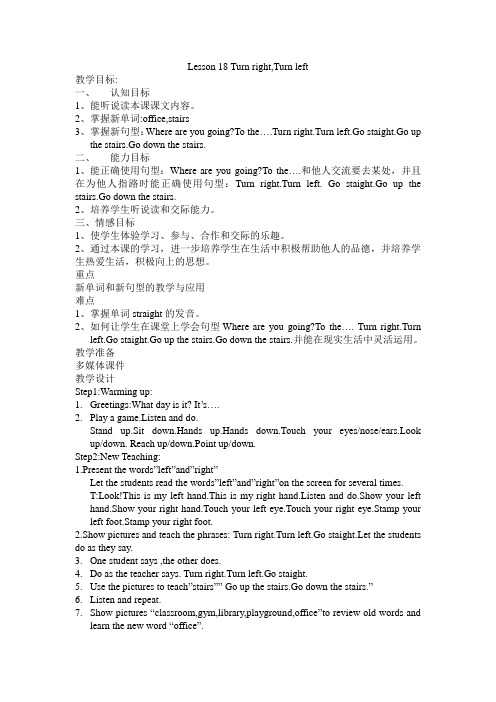
Lesson 18 Turn right,Turn left教学目标:一、认知目标1、能听说读本课课文内容。
2、掌握新单词:office,stairs3、掌握新句型:Where are you going?To the….Turn right.Turn left.Go staight.Go upthe stairs.Go down the stairs.二、能力目标1、能正确使用句型:Where are you going?To the….和他人交流要去某处,并且在为他人指路时能正确使用句型:Turn right.Turn left. Go staight.Go up the stairs.Go down the stairs.2、培养学生听说读和交际能力。
三、情感目标1、使学生体验学习、参与、合作和交际的乐趣。
2、通过本课的学习,进一步培养学生在生活中积极帮助他人的品德,并培养学生热爱生活,积极向上的思想。
重点新单词和新句型的教学与应用难点1、掌握单词straight的发音。
2、如何让学生在课堂上学会句型Where are you going?To the…. Turn right.Turnleft.Go staight.Go up the stairs.Go down the stairs.并能在现实生活中灵活运用。
教学准备多媒体课件教学设计Step1:Warming up:1.Greetings:What day is it? It’s….2.Play a game.Listen and do.Stand up.Sit down.Hands up.Hands down.Touch your eyes/nose/ears.Look up/down. Reach up/down.Point up/down.Step2:New Teaching:1.Present the words”left”and”right”Let the students read the words”left”and”right”on the screen for several times.T:Look!This is my left hand.This is my right hand.Listen and do.Show your left hand.Show your right hand.Touch your left eye.Touch your right eye.Stamp your left foot.Stamp your right foot.2.Show pictures and teach the phrases: Turn right.Turn left.Go staight.Let the students do as they say.3.One student says ,the other does.4.Do as the teacher says. Turn right.Turn left.Go staight.e the pictures to teach”stairs”” Go up the stairs.Go down the stairs.”6.Listen and repeat.7.Show pictures “classroom,gym,library,playground,office”to review old words andlearn the new word “office”.T:Wate is it? Ss:It’s a classroom/gym/library/playground. It’s an office.8.Show a mapT:How can she get to the classroom? Ss:Go straight…9.GameI hide an apple somewhere and let one student find it .Other students give her or him some help.They can use the sentences they have learned. “Turn right.Turn left.Go staight.:Step3:Practice1.Show picturesT:Where is he/she going? Ss:To the classroom/gym/library/office.2.Practice the dialogue in pairs.:Where is he/she going? To the classroom/gym/library/office.3.Explain:Where are you going? And listen,then answer the question:Where is shegoing?4.Show a pictureT:LiMing and LiuY ang meet each other.Here’s the dialogue between them.Please fill in the blanks.5.Try to remember the dialogue and act it out.6.Show another picture and let the students make a dialogue using the sentencesthey have learned.1)Prepare the dialogue in pairs.2)Presentation.Step4:ExerciseStep5:SummaryListen to a song “The Tabbit Dance”。
八年级英语下册lesson18教材内容详解冀教版

Lesson 18: Brandy Hates Cats!布兰迪讨厌猫!◆课文英汉对照Think About IT! 想一想!Would you like to have a pet dog? Why or why not?你想养只宠物狗吗?为什么或为什么不呢?Pets need love. What should you do to give love to your pet?宠物需要爱。
你应该做什么来表示你多你的宠物的爱呢?How does Mike look after his dog?迈克怎样照料他的狗?我是迈克。
我家养着一条名叫布兰迪的狗。
她(的毛)是褐黑相间的。
One time, Brandy ate some hamburgers. My dad was going to cook them for supper. He was 一次,布兰迪吃了一些汉堡包。
(那是)我爸爸准备用它们做晚饭的。
他当时talking to my mum. He wasn’t watching the hamburgers, but Brandy was! I can’t remember what 正和我妈妈谈话。
他没注意到汉堡包,但是布兰迪注意到了。
我记不得那晚we had for supper that day.我们晚饭吃的是什么了。
Pets need lots of love. That’s why we take Brandy for a walk every day. I take her to the宠物需要很多爱。
那就是我们每天带布兰迪去散步的原因。
我把她带到我park near my house. I throw sticks for her. She loves to get the sticks. Then she brings them to me. 附近的公园里。
我给它扔木棍。
她很喜欢捡木棍。
高中新概念英语第三册-Lesson 18(课文)

高中新概念英语第三册-Lesson 18(课文)TextLesson 18 Electric currents in modern art 现代艺术中的电流Modern sculpture rarely surprises us any more. The idea that modern art can only be seen in museums is mistaken. Even people who take no interest in art cannot have failed tonotice examples of modern sculpture on display in public places. Strange forms stand in gardens, and outside buildings and shops. We have got quite used to them. Some so-called'modern' pieces have been on display for nearly fifty years.In spite of this, some people--including myself--were surprised by a recent exhibition of modern sculpture. Thefirst thing I saw when I entered the art gallery was a notice which said: 'Do not touch the exhibits. Some of them are dangerous!' The objects on display were pieces of moving sculpture. Oddly shaped forms that are suspended from the ceiling and move in response to a gust of wind are quite familiar to everybody. These objects, however, were different. Lined up against the wall, there were long thin wiresattached to metal spheres. The spheres had been magnetizedand attracted or repelled each other all the time. In the centre of the hall, there were a number of tall structures which contained coloured lights. These lights flickered continuously like traffic lights which have gone mad. Sparks were emitted from small black boxes and red lamps flashed on and off angrily. It was rather like an exhibition ofprehistoric electronic equipment. These Peculiar forms notonly seemed designed to shock people emotionally, but to give them electric shocks as well!Language points(Attention: The following points are not covered by the video. It is better for you to watch the video or listen to the MP3 first and try to take notes on your own. Then you may check here to get more details. )1, Modern sculpture rarely surprises us any more. The idea that modern art can only be seen in museums is mistaken.rarely: not oftene.g. Modern sculpture does not surprise us any more.近义词:seldom: almost never 可见rarely的水准比seldom 要稍稍频繁一点句型转化:Sth. surprises sb. = sb. 系动词 surprised atby sth.that引导同位语从句,修饰限定the idea的内容。
Lesson 18 Never Catch a Dinosaur
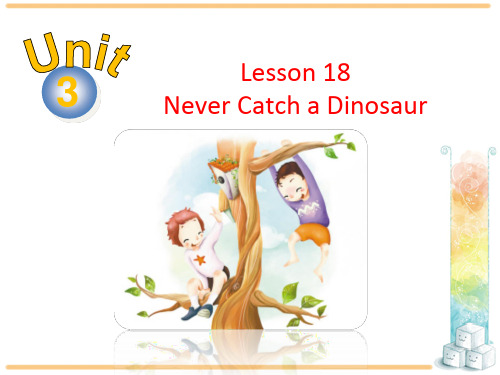
3
Lesson 18 Never Catch a Dinosaur
学习目标
objectives
To learn some words : rule, branch, training To describe an accident. To know it’s good to listen to other’s warnings about safety tips.
考向二 learn to do sth.学习做某事 eg:He has learned to cook by himself. 他已经学会了自己做饭。 相关的短语: learn about… “学习……, 知道……,了解……”。
知识点 2
advise /əd'vaɪz/ v. 建议;忠告
考向一
eg:The doctor advised me to take a rest. 医生建议我休息。
Why or why not?
Dear Brian, I got your email. I like your new rule. I will never try to catch a falling dinosaur. It isn't safe!
Lesson18NeverCatchaDinosaur教案

Lesson 18: Never Catch a DinosaurI. Learning aims:Master the new words:rule, branch, trainingII. Learning important and difficult points:1) I will never try to catch the falling dinosaur.2) You advised him to use a ladder, but he didn’t listen.3) I told her I would be careful.4) She watched me climb higher and higher.Language Points:1.. I will never try to catch the falling dinosaur. 我不会尽力接住一个正在落下来的恐龙了。
【用法】句中的falling 是现在分词作定语,意思是“正落下的”,修饰后面的名词dinosaur。
过去分词也有这种用法。
【举例】①Don’t wake up the sleeping boy. 不要叫醒那个熟睡的孩子。
②The broken computer hasn’t been fixed yet. 那台坏电脑还没修好呢。
【拓展】现在分词或过去分词短语作定语时则应该放在它们所修饰的名词之后。
【举例】①Do you know the girl singing in the room? 你认识正在房间里唱歌的那个女孩吗?②The table covered with paper is red. 用纸盖着的桌子是红色的。
2. I told her I would be careful. 我告诉她我会小心的。
【用法】这是带有宾语从句的复合句,主句为一般过去时,从句用的是过去将来时would be careful,在这里表示过去将要做某事。
- 1、下载文档前请自行甄别文档内容的完整性,平台不提供额外的编辑、内容补充、找答案等附加服务。
- 2、"仅部分预览"的文档,不可在线预览部分如存在完整性等问题,可反馈申请退款(可完整预览的文档不适用该条件!)。
- 3、如文档侵犯您的权益,请联系客服反馈,我们会尽快为您处理(人工客服工作时间:9:00-18:30)。
Read the lesson and write true (T) or false (F).
1. Li Ming’s mother picked up the presents from the post office. (
F
)
2. The jacket fits Li Ming very well.(
因……而感激…. 时尚 非常合身 笑啊笑 关掉 许愿 深吸一口气 吹灭 想起
thanks / thank you for be in fashion fit sb well laugh and laugh turn off make a wish take a deep breath blow out think of
n. 时尚,流行的式样 n. 气球 n. 蜡烛 adj. 深的 n. 空气;吸气
v.吹
Dear Jenny and Danny,
postman Many thanks for the presents! The ______ jacket ,Jenny. brought them to me. I love the _____ The style is in fashion in China. It fits me cap laughed well. Danny ,I also love the ____.I and laughed when I saw it .It looks ____ like your cap ! think of you when I wear it. I will ____
How old are you? How did you celebrate your birthday? What presents did you get ?
In china, eating long noodles means you will live a long life. Chinese people usually eat noodles on their birthdays.
What special food did you have for your birthday?
noodles.
Listen to the dialogue and fill in the blanks. Sara: Hi Wang Lei. I couldn’t wait to call you. Tell me about your birthday. Wang Lei: It was a lot of fun. Thank you presents for the lovely __________. Sara: Does the shirt _______ you? fit Wang Lei: Yes. It’s just my ________. size
6. There were thirteen candles on it. I made a wish. make a wish 许愿 e.g. He helps others make their wishes come true. 他帮助其他人实现他们的愿望。
7. Then I took a deep breath and blew
Sara: How about the _________? colour Wang Lei: It’s my favourite. You remembered! Sara: And the ________? style Wang Lei: It is in fashion here. Sara: I’m glad you like it. How about the cap? Wang Lei: I like it, too. I will think of you ___________ I wear it. when
1. Please turn ___ C the light in your room before you leave. A. into A. thanks B. like B. away C. off D. on D. love
D
A for your help. 2. Many ___
C. thank 3. What do you think ___ B the film?
★
Have you ever
received an interesting gift?
★
How do you usually
celebrate your birthday?
postman
fashion balloon candle deep breath blow (blew/blown)
n. 邮递员
ቤተ መጻሕፍቲ ባይዱ
A. about B. of C. over D. up
4. The dress fits you ______. B A. good B. well C. nice D. bad 5. The shoes are ____fashion now. D A. on B. at C. over D. in
我喜欢你的牛仔裤,很时尚。
3. The jacket fits me very well. fit (fit, fit) 合适 fit … well 非常合身 e.g. This coat doesn’t fit me well. 这件上衣不合适我。 4. I laughed and laughed when I saw it. 句中两个动词用连接,强调动作的连续 反复。We talked and talked.
1. Copy and dictate the new words and make sentences. 2. My mother’s birthday 3. finish off your exercise books.
Sara: Did you have a birthday party? Wang Lei: Yes. My mum and dad held a party for me. We ate __________. noodles Noodles are a __________ birthday food special in China. Eating long noodles means you will have a long _________. life
1.Many thanks for the presents! 非常感谢你的礼物。 Thank you for your helping. 谢谢你的帮助。
• 2. The style is in fashion here in China. in fashion / style 时尚 out of fashion / style 过时 e.g. I like your jeans, they are in fashion.
out the candles immediately.
blow out 吹熄,吹灭 e.g. Jane blows out the candles
on her birthday cake.
简吹灭了她的生日蜡烛。
My birthday
What’s your name?
When is your birthday?
II: 根据汉语翻译下了句子。 1.她的衣服总是很时尚。 fashion are always in Her clothes____ _______. 2. 当我们离开教室的时候,请关灯。 Please _______ turn off the light when you leave the Classroom. 3.在生日聚会上你经常许愿吗? a wish on your birthday Do you always make _________ party. 4.当高兴的跳啊跳去庆祝妈妈的生日。 jumped and jumped We ___________________ happily to celebrate my mother’s birthday. .
F
)
5.Li Ming made a wish , took a deep breath and blew out the candles.(
T
)
5. When it was time for dessert, she
turned off the lights,…
turn off 关(水源,煤气,电灯等), 一般可用shut off 替换 turn on 打开 e.g. You must turn off the TV. 你必须关掉电视。 Turn on the light . 打开电灯。
T
)
3. Danny gave his own cap to Li Ming. (
F)
4. When it was time for dessert, Li Ming’s father turned off
the lights, and his mother carried the cake into the room. (
